Ashley Linch's Web Eval
advertisement
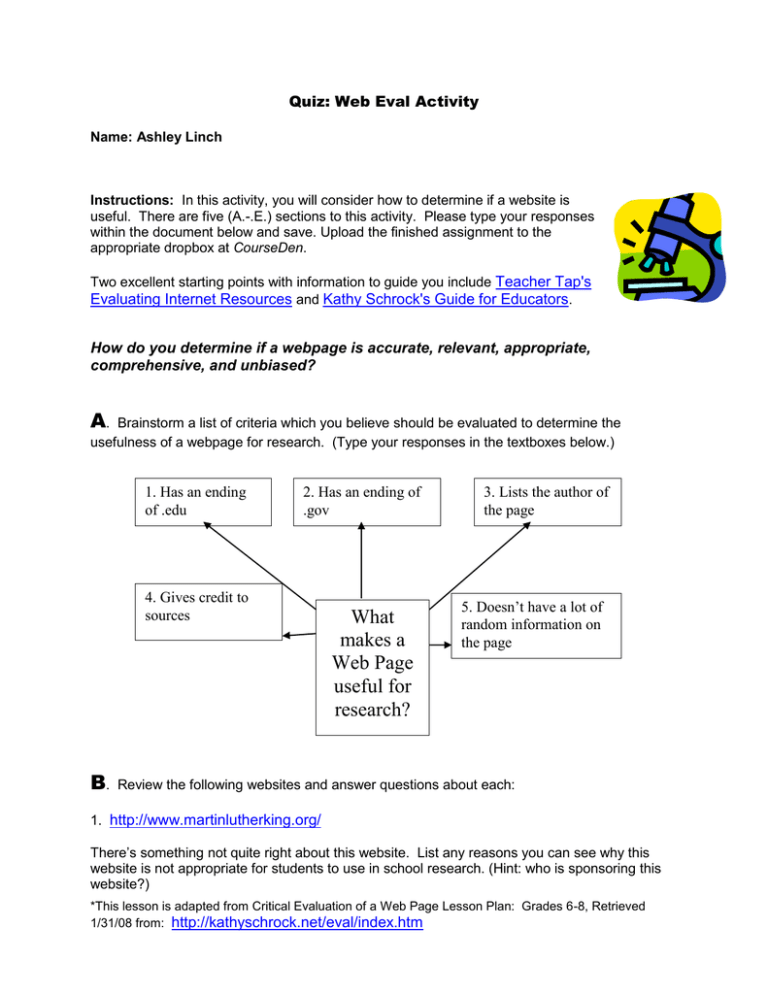
Quiz: Web Eval Activity Name: Ashley Linch Instructions: In this activity, you will consider how to determine if a website is useful. There are five (A.-.E.) sections to this activity. Please type your responses within the document below and save. Upload the finished assignment to the appropriate dropbox at CourseDen. Two excellent starting points with information to guide you include Teacher Tap's Evaluating Internet Resources and Kathy Schrock's Guide for Educators. How do you determine if a webpage is accurate, relevant, appropriate, comprehensive, and unbiased? A. Brainstorm a list of criteria which you believe should be evaluated to determine the usefulness of a webpage for research. (Type your responses in the textboxes below.) 1. Has an ending of .edu 2. Has an ending of .gov 4. Gives credit to sources B. What makes a Web Page useful for research? 3. Lists the author of the page 5. Doesn’t have a lot of random information on the page Review the following websites and answer questions about each: 1. http://www.martinlutherking.org/ There’s something not quite right about this website. List any reasons you can see why this website is not appropriate for students to use in school research. (Hint: who is sponsoring this website?) *This lesson is adapted from Critical Evaluation of a Web Page Lesson Plan: Grades 6-8, Retrieved 1/31/08 from: http://kathyschrock.net/eval/index.htm Stormfront, which is a white pride organization, hosts the side. Also it has rap lyrics on it which probably isn’t great for kids to use in research. 2. http://www.dhmo.org/ I (your instructor) am an ardent supporter of the cause to ban DHMO. Based on the information you find on this webpage, will you join me in supporting this cause? Why or why not? (If you dig deeply enough, you will discover why not.) The advertisements on this page are not completely great for kids. Also, at the bottom under the author it states that “content veracity not implied”. C. Below you will find six important website evaluation criteria. These criteria are explained with examples at the Good, Bad, and the Ugly website (brought to us by the New Mexico State University Library). Read through this website, then answer the questions that follow about each website. 1. Authority Do you consider the author of Clonaid to be an expert of the subject covered? Why or why not? I do not even see an author listed. The web address is not an organization, nor an educational website neither. 2. Accuracy What information in The True…Facts about Women with AIDS leads you to believe or disbelieve its accuracy? The facts seem somewhat odd to begin with. There are also two copyright dates, and the doctor who is listed at the author at the top is not the copyrighter. There is no appearance of an editor who checks the page. Also, the information at the bottom of the page telling me it is bogus, lets me know. 3. Objectivity Can you determine the real purpose of The Truth? What is it and how did you determine the purpose? It is a way to try to get people to stop using tobacco. I found this out by clicking on the information/about us section. *This lesson is adapted from Critical Evaluation of a Web Page Lesson Plan: Grades 6-8, Retrieved 1/31/08 from: http://kathyschrock.net/eval/index.htm 4. Currency Is it easy to determine the currency of The Onion? What did you do to determine the currency of the site? This site is current. It has posts of articles and videos from today, and the links work when clicking on them. It’s copyright is also up to date. 5. Coverage Do you consider the information on OncoLink to be relevant and comprehensive? Why or why not? Yes. The website is organization based. The links are current, and there are recent posts. There is information on the authors and the sources, and the information is backed up by expert doctors. The information isn’t opinionated, it is factual. D. Visit the following pages and briefly share your thoughts (a sentence or two) about how you might guide your future K-12 students in determining the reliability of the information found: http://www.google.com/technology/pigeonrank.html http://zapatopi.net/treeoctopus/ http://www.weathergraphics.com/tim/fisher/ -I would ask students to fully read what is said on the page, and to think about it and read it again. On the google page: do we really see pigeons using computers? I would have them search everywhere for information as to whether or not it is false. This site tells us at the bottom it was printed on April Fool’s Day. -On the second website, I would ask my students what the ending of the site is (.net), and how they felt about the page’s display. I would have them locate author information, and view all of the information on the bottom of the page. It states it is not associated with any school or educational organization, and it seems to just be created by a student or someone who is not an expert. Sources aren’t listed either. -Just as the first website, I would have students look at the pictures, and try to understand that a real airplane isn’t being talked about; a toy one is. I would have them always read through everything and look at pictures before deciding if a website is reputable. *This lesson is adapted from Critical Evaluation of a Web Page Lesson Plan: Grades 6-8, Retrieved 1/31/08 from: http://kathyschrock.net/eval/index.htm E. Write a paragraph explaining why it is important to evaluate the information found on a Web page, include the ways to find out more about the author, the sponsoring agency, or the information itself. Paste this information on your Web Eval wiki page. It is very important to evaluate the information found on a website, because anyone can write anything they want to on there. Students, and even adults, use the internet to get quick facts about things, even medical conditions. They rely on websites to give accurate information, and all too often put too much faith in the sites. The internet is so handy, however, being so accessible, so if we can check for accurate information, then we CAN rely on sites. We should always look at the web address, and see what kind of page it is. Pictures and text should be read through more than once, looking for any oddities. By looking under an about us section on a page, you can learn the true purpose of the page. An author should also always be listed, with a link to a page about them, or a contact page. If an agency is sponsoring a page, there should be links to other pages affiliated with that sponsor so more information can be learned about them. Links should be up to date on pages, and so should the copyright. There should be an editor present, and there should be recent posts. Valid websites are always active. *This lesson is adapted from Critical Evaluation of a Web Page Lesson Plan: Grades 6-8, Retrieved 1/31/08 from: http://kathyschrock.net/eval/index.htm
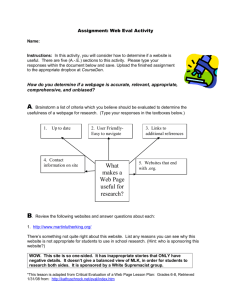
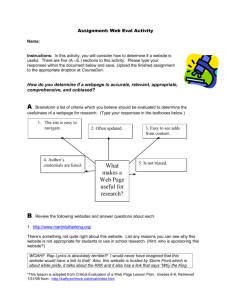
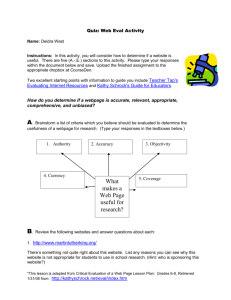
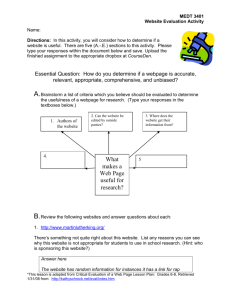
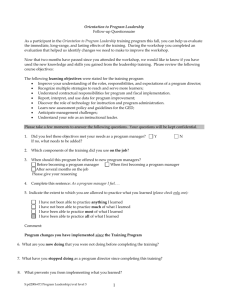
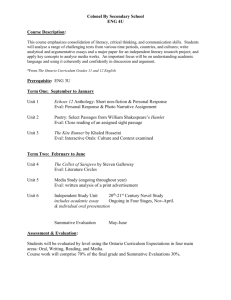
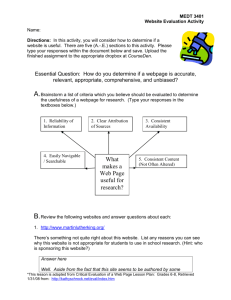
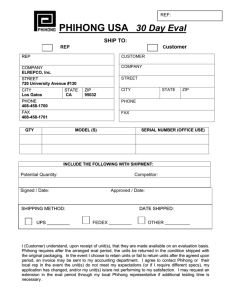
![Please go to the following website [eval.franklin.uga.edu] and fill out](http://s3.studylib.net/store/data/008442817_1-afd5046c9c27af7ab7918658ed8da10d-300x300.png)